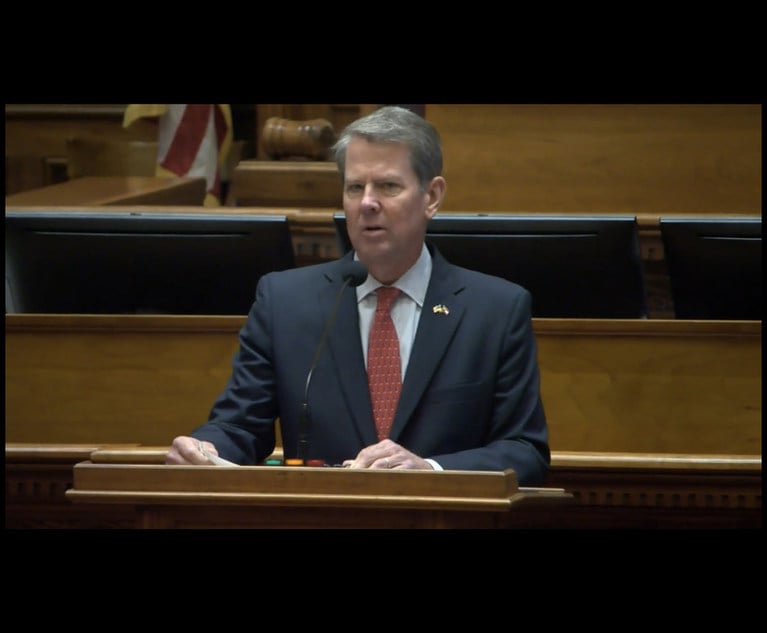Massachusetts AG Pens Amicus Brief Supporting Objections to Equifax Settlement
A hearing to approve the $1.4 billion settlement is scheduled for Thursday.
December 18, 2019 at 02:55 PM
3 minute read
 Massachusetts Attorney General Maura Healey. (Courtesy photo)
Massachusetts Attorney General Maura Healey. (Courtesy photo)
The Massachusetts attorney general is objecting to the proposed Equifax data breach settlement, calling it an "end run" by the Atlanta-based credit bureau to avoid ongoing litigation in her state.
In an amicus brief supporting other objectors to the proposed $1.4 billion settlement, Massachusetts Attorney General Maura Healey asked Chief Judge Thomas Thrash of the U.S. District Court for the Northern District of Georgia to reject the settlement unless it's modified to ensure that Massachusetts' case against Equifax can proceed.
Healey opposes any inference that Massachusetts is bound by the proposed settlement. She cited an ongoing civil enforcement action filed in Massachusetts shortly after Equifax went public with news of the breach in September 2017.
That suit, filed in Suffolk Superior State Court, contends that Equifax's 2017 data breach imperiled the personal and financial information of an estimated 147 million consumers in violation of the Massachusetts Consumer Protection Act and the states data protection law. That litigation seeks unspecified civil penalties, consumer restitution and other unspecified relief.
Equifax has unsuccessfully attempted to dismiss or stay the Massachusetts litigation, which is in discovery, according to Healey.
Healey said her office was formally notified of the proposed settlement last August. "At no point prior thereto was Massachusetts consulted, invited, or permitted to provide any input to the terms of the proposed settlement agreement," she said.
A hearing to approve the settlement and $77.5 million in legal fees requested by the consumer class counsel is set for Thursday.
Equifax co-lead counsel David Balser and Phyllis Sumner of King & Spalding in Atlanta, couldn't be reached for comment. Co-lead counsel for the consumer class—Ken Canfield of Atlanta's Doffermyre Shields Canfield & Knowles; Amy Keller of Dicello Levitt Gutzler in Chicago and Norman Siegel of Stueve Siegel Hanson in Kansas City, Missouri—also couldn't be reached.
Attorneys general in 48 states, Puerto Rico and the District of Columbia as well the U.S. Federal Trade Commission and the U.S. Consumer Financial Protection Bureau were involved in negotiations with Equifax over a proposed settlement and will collectively benefit from the final deal, Healey said.
But she said that Massachusetts or Indiana joined in that multistate agreement and played no role in negotiating its terms. Indiana Attorney General Curtis Hill filed a separate amicus brief on Dec. 5 with similar objections to the proposed settlement.
Healey said she and Hill requested that Equifax and counsel for the consumer class modify language in the proposed settlement to "make clear" it would not include their two states.
During that call, Equifax counsel "expressed an unwillingness to make the modification," Healey said.
In emails Healey's office exchanged between Nov. 15 and Dec. 4 with counsel for Equifax and the consumer class, Massachusetts again requested that they modify the release language to make clear it would not include the two states' claims, Henley said. Counsel for both Equifax and the plaintiff class refused to to do so, Healey said.
As a result, Massachusetts has been placed "in an unfair position vis-a-vis her sister states, which separately settled with [Equifax] and negotiated a separate release for their own sovereign claims," she said.
This content has been archived. It is available through our partners, LexisNexis® and Bloomberg Law.
To view this content, please continue to their sites.
Not a Lexis Subscriber?
Subscribe Now
Not a Bloomberg Law Subscriber?
Subscribe Now
NOT FOR REPRINT
© 2025 ALM Global, LLC, All Rights Reserved. Request academic re-use from www.copyright.com. All other uses, submit a request to [email protected]. For more information visit Asset & Logo Licensing.
You Might Like
View All
Georgia Republicans Push to Limit Lawsuits. But Would That Keep Insurance Rates From Rising?
5 minute read
A Plan Is Brewing to Limit Big-Dollar Suits in Georgia—and Lawyers Have Mixed Feelings
10 minute read
Panel to Decide if Governor Should Suspend Georgia Lawyer From Elected Post
4 minute readLaw Firms Mentioned
Trending Stories
- 1Newsmakers: Littler Elevates Dallas Attorney to Shareholder
- 2South Florida Real Estate Lawyers See More Deals Flow, But Concerns Linger
- 3General Counsel Accused of Destroying Evidence
- 42,000 Docket Entries: Complex South Florida Dispute Sets Precedent
- 5Incoming Howard University Law Professor Kiah Duggins Among DC Plane Crash Victims
Who Got The Work
J. Brugh Lower of Gibbons has entered an appearance for industrial equipment supplier Devco Corporation in a pending trademark infringement lawsuit. The suit, accusing the defendant of selling knock-off Graco products, was filed Dec. 18 in New Jersey District Court by Rivkin Radler on behalf of Graco Inc. and Graco Minnesota. The case, assigned to U.S. District Judge Zahid N. Quraishi, is 3:24-cv-11294, Graco Inc. et al v. Devco Corporation.
Who Got The Work
Rebecca Maller-Stein and Kent A. Yalowitz of Arnold & Porter Kaye Scholer have entered their appearances for Hanaco Venture Capital and its executives, Lior Prosor and David Frankel, in a pending securities lawsuit. The action, filed on Dec. 24 in New York Southern District Court by Zell, Aron & Co. on behalf of Goldeneye Advisors, accuses the defendants of negligently and fraudulently managing the plaintiff's $1 million investment. The case, assigned to U.S. District Judge Vernon S. Broderick, is 1:24-cv-09918, Goldeneye Advisors, LLC v. Hanaco Venture Capital, Ltd. et al.
Who Got The Work
Attorneys from A&O Shearman has stepped in as defense counsel for Toronto-Dominion Bank and other defendants in a pending securities class action. The suit, filed Dec. 11 in New York Southern District Court by Bleichmar Fonti & Auld, accuses the defendants of concealing the bank's 'pervasive' deficiencies in regards to its compliance with the Bank Secrecy Act and the quality of its anti-money laundering controls. The case, assigned to U.S. District Judge Arun Subramanian, is 1:24-cv-09445, Gonzalez v. The Toronto-Dominion Bank et al.
Who Got The Work
Crown Castle International, a Pennsylvania company providing shared communications infrastructure, has turned to Luke D. Wolf of Gordon Rees Scully Mansukhani to fend off a pending breach-of-contract lawsuit. The court action, filed Nov. 25 in Michigan Eastern District Court by Hooper Hathaway PC on behalf of The Town Residences LLC, accuses Crown Castle of failing to transfer approximately $30,000 in utility payments from T-Mobile in breach of a roof-top lease and assignment agreement. The case, assigned to U.S. District Judge Susan K. Declercq, is 2:24-cv-13131, The Town Residences LLC v. T-Mobile US, Inc. et al.
Who Got The Work
Wilfred P. Coronato and Daniel M. Schwartz of McCarter & English have stepped in as defense counsel to Electrolux Home Products Inc. in a pending product liability lawsuit. The court action, filed Nov. 26 in New York Eastern District Court by Poulos Lopiccolo PC and Nagel Rice LLP on behalf of David Stern, alleges that the defendant's refrigerators’ drawers and shelving repeatedly break and fall apart within months after purchase. The case, assigned to U.S. District Judge Joan M. Azrack, is 2:24-cv-08204, Stern v. Electrolux Home Products, Inc.
Featured Firms
Law Offices of Gary Martin Hays & Associates, P.C.
(470) 294-1674
Law Offices of Mark E. Salomone
(857) 444-6468
Smith & Hassler
(713) 739-1250







